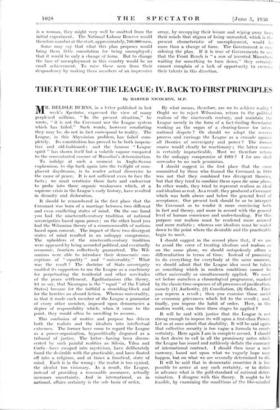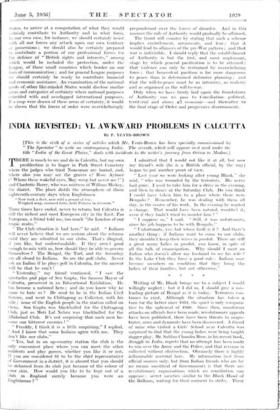TILE FUTURE OF THE LEAGUE: IV. BACK TO FIRST PRINCIPLES
By HAROLD NICOLSON, M.P.
MR. DELISLE BURNS, in a letter published in last week's Spectator, expressed the view of many perplexed millions. " In the present situation," he wrote, " it is not the Covenant nor the League system which has failed." Such words; however comforting they may be, do not in fact correspond to reality. The League, in this Abyssinian problem, has failed coin- pletely. Its constitution has proved to be both inopera- tive and old-fashioned ; and the famous "League spirit " has shown itself but a volatile vapour compared to the concentrated essence of Mussolini's determination.
To indulge at such a moment in Anglo-Saxon euphemism, to slip back again into the twilight of com- placent daydreams, is to render actual disservice to the cause of peace. It is not sufficient even to face the facts ; we must scrutinise those facts and endeavour to probe into those organic weaknesses which, at a supreme crisis in the League's early history, have resulted in disunity and dislocation.
It should be remembered in the first place that the Covenant was born of a marriage between two different and even conflicting states of mind. On the one hand you had the nineteenth-century tradition of national sovereignties based upon power ; on the other hand you had the Wilsonian theory of a commonwealth of nations based upon consent. The impact of these two divergent states of mind resulted in an unhappy compromise. The upholders of the nineteenth-century tradition were appeased by being accorded political, and eventually economic, frontiers collectively guaranteed. The Wil- sonians were able to introduce their democratic con- ceptions of " equality" and " universality." What was the result ? The doctrine of State sovereignty enabled its supporters to use the League as a machinery for perpetuating the territorial and other servitudes of the peace settlement. Egalitarianism (the theory, let us say, that Nicaragua is the " equal " of the United States) became for the faithful a stumbling-block and for the heretics an absurd fiction. Whereas universality, in that it made each member of the League a guarantor of every other member, imposed upon democracies a degree of responsibility which, when 'it came to the point, they would often be unwilling to assume.
This confusion of motive and purpose has driven both the realists and the idealists into intellectual extremes. The former have come to regard the League as a power-organisation, hypocritically disguised as a tribunal of justice. The latter—having been discon- certed by such painful realities as Silesia, Vilna and Corfu—have escaped into mysticism, have deliberately fused the desirable with the practicable, and have floated off into a religious, and at times a fanatical, state of mind. Each is in the wrong : the realist is too cynical, the idealist too visionary. As a result, the League, instead of providing a reasonable assurance, actually increases uncertainty. And in international, as in national, affairs certainty is the sole basis of order. By what means, therefore, are we to achieve reality ? Ought we to reject Wilsonism, return to the political realism of the nineteenth century, and maintain the League merely in the form of a fact-finding Secretariat working as the organ of a clearing-house for inter- national dispute ? Or should we adopt the reverse process and envisage the League as a crusade against all theories of sovereignty and power ? The former course would clearly be reactionary ; the latter course is certainly impracticable. Must we therefore return to the unhappy compromise of 1919? I for one shall surrender to no such pessimism.
I should suggest in the first place that the error committed by those who framed the Covenant in 1919 was not that they combined two divergent theories, but that they tried to combine them upon the sante plane. In other words, they tried to represent realism as ideal and idealism as real. As a result, they produced a Covenant which was both above and below the general level of acceptance. Our present task should be so to interpret the Covenant as to render it more convincing both in fact and theory, and more in accord with the general level of human conscience and understanding. For this purpose our realism must be rendered more avowed and more realistic ; whereas our idealism must be scaled down to the point where the desirable and the practicable begin to meet.
I should suggest in the second place that, if we are to avoid the error of treating idealism and realism as on the same plane, we should outspokenly affirm a differentiation in terms of time. Instead of promising to do everything for everybody at the same moment, we should admit that the League idea must be taken as something which in modern conditions cannot be either universally or simultaneously applied. We must set before ourselves a chronological programme, marked by the classic time-sequence of all processes of pacification, namely (1) Authority, (2) Conciliation, (3) Order. First you repress a revolt ; then you examine 'those social or economic grievances which led to the revolt ; and, finally, you impose the habit of order. How, in the modern world, can these three stages be applied ? • It will be said with justice that the League is not strong enough to impose its will upon a first-class Power.
Let us at once admit that disability. It will be said again that collective security is too vague a formula to create certainty. Here again I am in complete accord. I should in fact desire to call in all the promissory notes which the League has issued and ruthlessly deflate the currency of international contract. I should then issue a new currency, •based not upon what we vaguely hope may happen, but on what we are severally determined to do. It will be said that in democratic countries it is im- possible to arrive at any such certainty, or to define in advance what is the gold,standard of. national deter- mination. I disagree with this theory. . It ought to be feasible, by examining the conditions of the like-minded States, to arrive at a computation of what they would ,ertainl y_ contribute ' to Authority and in what, form. In our' own case, for instance, we should certainty resist with all our forces, any attack upon our own territory or possessions; we should also be certainly prepared to contribute a portion of our professional forces for the defence of "British rights and interests," among which would be included the protection, under. the League, of those small countries which border on our lines of communication ; and for general League purposes we should certainly be ready to contribute financial and economic assistance. An examination of the national needs of other like-minded -States wo:uld disclose similar' areas and categories of certainty where national purposes coincided with and overlapped international purposes. If a map were drawn of these areas of certainty, it would be shown that the forces of order were overwhelmingly preponderant over the forces of disorder. And in this manner the rule of Authority would gradually be alhirmed.
The timid will counter by stating that such a scheme implies encirclement, armaments, and fear ; that it would lead to alliances of the pre-War pattern ; and that war is indivisible. I should reply that the establishment of Authority is but the first, and most unpleasant, stage by which general pacification is to be attained ; that violence can only be restrained by overwhelming force ; that benevolent pacifism is far more dangerous to peace than is determined defensive planning ; and that the will-to-peace must be as intensive, as realistic and as organised as the will-to-war. I. • Only when we have firmly laid again the foundations of Authority can we pass to Conciliation —politieal, territorial and above all economic—and thereafter to the final stage of Order and progressive disarmament. .















































 Previous page
Previous page